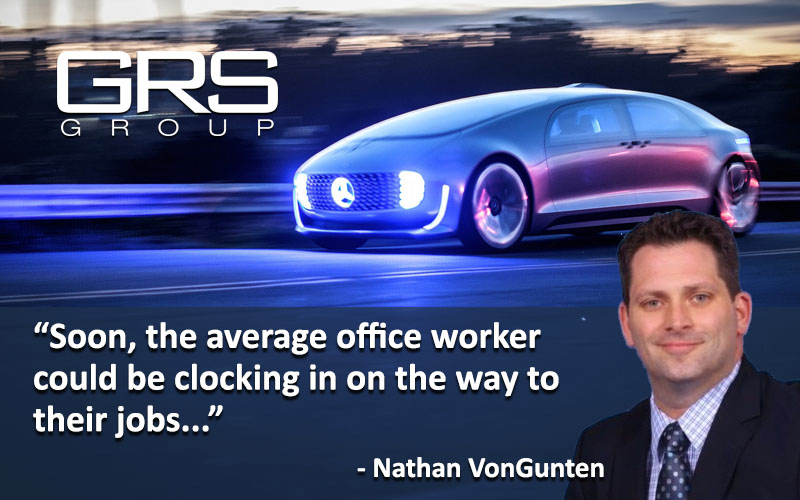Nathan VonGunten is a director at GRS Group. He can be reached at 330.242.1991 or via email at nvongunten@fv2.d32.myftpupload.com
Working in a car is already a reality for many in the commercial real estate industry, especially those in brokerage who are on the road, traveling to several sites a day to meet with clients. The demands of the job turn the vehicle into a mobile office, powered by a smart phone, and a (hopefully) careful multitasker.
Soon, though, the average office worker could be clocking in on the way to their jobs, thanks to the advent of autonomous vehicles and ride-sharing services, according to a new Cushman & Wakefield report (download here).
Office buildings with limited-to-no parking are still several years down the road. But in the near term, the two commercial real estate sectors that will experience an obvious impact are industrial buildings and data centers.
In the case of industrial real estate, driverless long-haul trucks will allow products to move long distances without stopping, drastically cutting labor costs and making the supply chain less reliant on facilities near ports and trains. This means that industrial buildings can locate in more sparse, out-of-the-way areas, reducing higher real estate costs that come with more populous areas.
Data centers, which are expanding rapidly due to the increased use of the cloud, will see even more growth as self-driving technologies have larger space requirements. This will be driven by constantly streaming operational software, as well as other apps and content, such as news, advertisements and entertainment for riders. Cushman says that one automated vehicle can produce 30 terrabytes of data per day, and these machines will need a 5G connection to operate.
As these high-tech vehicles become more prevalent, that means people will have more time to work on their way to the office instead of having to concentrate on the road. Don’t be surprised if some businesses have employees clock in before they even arrive in the front door!
Further in the future as well, Cushman points out, there will be a substantial decrease in the need for parking at many commercial real estate assets. When an autonomous vehicle drops you off at work, there won’t be a need to park it at the office, when it can simply return home or possibly do automated errands. This would significantly cut down on development costs, as parking is reportedly considered 25 percent of a CRE building’s space. The extra room can also be converted into other uses, such as last-mile warehousing for e-commerce goods. Cushman uses 1111 Lincoln Road, in Miami, as an example of literally mixing a parking garage with other uses, making the experience of the building changeable.
But there are a lot some unanswered questions? Won’t all of this constant driving take up a lot of energy, even if the cars are electric? And studies say that self-driving cars could cause increased congestion.
In whatever form, a change is coming, and whatever it is, commercial real estate will have to adapt.
About GRS Group
GRS Group is a leading provider of commercial real estate (“CRE”) services worldwide. With offices across the United States, Europe, and affiliates around the globe, GRS Group provides local market knowledge with a global perspective for institutional real estate investors, occupiers and lenders worldwide. The GRS Group team has evaluated and advised on over $1 trillion in CRE transactions.
Through the company’s proprietary management process, Global Services Connection, GRS Group delivers an integrated suite of services including Financial Advisory, Transaction Management, Assessment and Title Insurance. We provide a single point of contact, capable of leveraging the GRS Group portfolio of companies and delivering customized solutions to assist our clients in achieving their investment goals.

